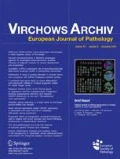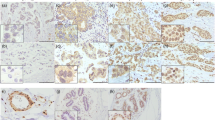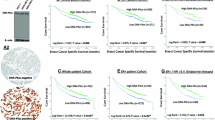Abstract
Polo-like kinase (PLK) family members are known to be functionally involved in mitotic signaling and in cytoskeletal reorganization in both normal and malignant cells. In this study, expression of PLK1 and PLK3 was determined immunohistochemically in tissue specimens of 135 breast carcinomas, and expression was correlated with clinicopathological parameters and patient prognosis. Strong PLK isoform overexpression was observed in 42.2% (PLK1) and 47.4% (PLK3) of breast carcinomas when compared with non-transformed breast tissue. A positive correlation of PLK isoform expression with tumor grade, vascular invasion, erbB2/HER-2 expression and markers of proliferative activity was evident. Additionally, an inverse correlation of PLK isoform expression and estrogen receptor status was observed. Overexpression of PLK3 but not of PLK1 was significantly linked to reduced median overall (P<0.001) and relapse-free (P=0.021) survival time. PLK3 expression remained an independent prognostic factor for overall (RR=3.2, P=0.002) and relapse-free (RR=2.9, P=0.049) survival in multivariate survival analysis. These results suggest PLK3 as a novel independent prognostic marker in breast cancer and hint toward a role for PLK isoform overexpression in disease progression. Therefore, in vivo inhibition of PLK family members might represent a rewarding approach in the development of new anticancer drugs for this tumor entity.



Similar content being viewed by others
References
Bahassi el M, Conn CW, Myer DL, Hennigan RF, McGowan CH, Sanchez Y, Stambrook PJ (2002) Mammalian Polo-like kinase 3 (Plk3) is a multifunctional protein involved in stress response pathways. Oncogene 21:6633–6640
Barr FA, Sillje HH, Nigg EA (2004) Polo-like kinases and the orchestration of cell division. Nat Rev Mol Cell Biol 5:429–440
Bertz J, Hentschel S, Hundsdörfer G, Kaatsch P, Katalinic A, Lehnert M Schön D, Stegmaier C, Ziegler H (2004) Krebs in Deutschland. 4. überarbeitete, aktualisierte Ausgabe. Arbeitsgemeinschaft Bevölkerungsbezogener Krebsregister in Deutschland, Saarbrücken
Chase D, Feng Y, Hanshew B, Winkles JA, Longo DL, Ferris DK (1998) Expression and phosphorylation of fibroblast-growth-factor-inducible kinase (Fnk) during cell-cycle progression. Biochem J 333:655–660
Dai W, Wang Q, Traganos F (2002) Polo-like kinases and centrosome regulation. Oncogene 21:6195–6200
Dietzmann K, Kirches E, von Bossanyi P, Jachau K, Mawrin C (2001) Increased human polo-like kinase-1 expression in gliomas. J Neuro-Oncol 53:1–11
Donaldson MM, Tavares AA, Hagan IM, Nigg EA, Glover DM (2001) The mitotic roles of Polo-like kinase. J Cell Sci 114:2357–2358
Elez R, Piiper A, Kronenberger B, Kock M, Brendel M, Hermann E, Pliquett U, Neumann E, Zeuzem S (2003) Tumor regression by combination antisense therapy against Plk1 and Bcl-2. Oncogene 22:69–80
Elston CW, Ellis IO (1991) Pathological prognostic factors in breast cancer. I. The value of histological grade in breast cancer: experience from a large study with long-term follow-up. Histopathology 5:403–410
Golan A, Yudkovsky Y, Hershko A (2002) The cyclin–ubiquitin ligase activity of cyclosome/APC is jointly activated by protein kinases Cdk1-cyclin B and Plk. J Biol Chem 277:15552–15557
Goldhirsch A, Wood WC, Gelber RD, Coates AS, Thurlimann B, Senn HJ (2003) Meeting highlights: updated international expert consensus on the primary therapy of early breast cancer. J Clin Oncol 21:3357–3365
Holtrich U, Wolf G, Yuan J, Bereiter-Hahn J, Karn T, Weiler M, Kauselmann G, Rehli M, Andreesen R, Kaufmann M, Kuhl D, Strebhardt K (2000) Adhesion induced expression of the serine/threonine kinase Fnk in human macrophages. Oncogene 19:4832–4839
Ito Y, Miyoshi E, Sasaki N, Kakudo K, Yoshida H, Tomoda C, Uruno T, Takamura Y, Miya A, Kobayashi K, Matsuzuka F, Matsuura N, Kuma K, Miyauchi A (2004) Polo-like kinase 1 overexpression is an early event in the progression of papillary carcinoma. Br J Cancer 90:414–418
Jemal A, Tiwari RC, Murray T, Ghafoor A, Samuels A, Ward E, Feuer EJ, Thun MJ; American Cancer Society (2004) Cancer statistics, 2004. CA Cancer J Clin 54:8–29
Jensen EV, Cheng G, Palmieri C, Saji S, Makela S, Van Noorden S, Wahlstrom T, Warner M, Coombes RC, Gustafsson JA (2001) Estrogen receptors and proliferation markers in primary and recurrent breast cancer. Proc Natl Acad Sci U S A 98:15197–15202
Kauselmann G, Weiler M, Wulff P, Jessberger S, Konietzko U, Scafidi J, Staubli U, Bereiter-Hahn J, Strebhardt K, Kuhl D (1999) The polo-like protein kinases Fnk and Snk associate with a Ca(2+)- and integrin-binding protein and are regulated dynamically with synaptic plasticity. EMBO J 18:5528–5539
Knecht R, Elez R, Oechler M, Solbach C, von Ilberg C, Strebhardt K (1999) Prognostic significance of polo-like kinase (PLK) expression in squamous cell carcinomas of the head and neck. Cancer Res 59:2794–2797
Kneisel L, Strebhardt K, Bernd A, Wolter M, Binder A, Kaufmann R (2002) Expression of polo-like kinase (PLK1) in thin melanomas: a novel marker of metastatic disease. J Cutan Pathol 29:354–358
Lee M, Daniels MJ, Venkitaraman AR (2004) Phosphorylation of BRCA2 by the Polo-like kinase Plk1 is regulated by DNA damage and mitotic progression. Oncogene 23:865–872
Liu X, Erikson RL (2003) Polo-like kinase (Plk)1 depletion induces apoptosis in cancer cells. Proc Natl Acad Sci U S A 100:5789–5794
Manning G, Whyte DB, Martinez R, Hunter T, Sudarsanam S (2002) The protein kinase complement of the human genome. Science 298:1912–1934
Nicholson RI, McClelland RA, Robertson JF, Gee JM (1999) Involvement of steroid hormone and growth factor cross-talk in endocrine response in breast cancer. Endocr Relat Cancer 6:373–387
Nigg EA (1998) Polo-like kinases: positive regulators of cell division from start to finish. Curr Opin Cell Biol 10:776–783
Ouyang B, Pan H, Lu L, Li J, Stambrook P, Li B, Dai W (1997) Human Prk is a conserved protein serine/threonine kinase involved in regulating M phase functions. J Biol Chem 272:28646–28651
Spänkuch-Schmitt B, Bereiter-Hahn J, Kaufmann M, Strebhardt K (2002) Effect of RNA silencing of polo-like kinase-1 (PLK1) on apoptosis and spindle formation in human cancer cells. J Natl Cancer Inst 94:1863–1877
Spyratos F, Ferrero-Pous M, Trassard M, Hacene K, Phillips E, Tubiana-Hulin M, Le Doussal V (2002) Correlation between MIB-1 and other proliferation markers: clinical implications of the MIB-1 cutoff value. Cancer 94:2151–2159
Sumara I, Vorlaufer E, Stukenberg PT, Kelm O, Redemann N, Nigg EA, Peters JM (2002) The dissociation of cohesin from chromosomes in prophase is regulated by Polo-like kinase. Mol Cell 9:515–525
Sunkel CE, Glover DM (1988) Polo, a mitotic mutant of Drosophila displaying abnormal spindle poles. J Cell Sci 89:25–38
Takahashi T, Sano B, Nagata T, Kato H, Sugiyama Y, Kunieda K, Kimura M, Okano Y, Saji S (2003) Polo-like kinase 1 (PLK1) is overexpressed in primary colorectal cancers. Cancer Sci 94:148–152
Tirkkonen M, Tanner M, Karhu R, Kallioniemi A, Isola J, Kallioniemi OP (1998) Molecular cytogenetics of primary breast cancer by CGH. Genes Chromosomes Cancer 21:177–184
Tokumitsu Y, Mori M, Tanaka S, Akazawa K, Nakano S, Niho Y (1999) Prognostic significance of polo-like kinase expression in esophageal carcinoma. Int J Oncol 15:687–692
Toyoshima-Morimoto F, Taniguchi E, Nishida E (2002) Plk1 promotes nuclear translocation of human Cdc25C during prophase. EMBO Rep 3:341–348
Volpi A, Nanni O, De Paola F, Granato AM, Mangia A, Monti F, Schittulli F, De Lena M, Scarpi E, Rosetti P, Monti M, Gianni L, Amadori D, Paradiso A (2003) HER-2 expression and cell proliferation: prognostic markers in patients with node-negative breast cancer. J Clin Oncol 21:2708–2712
Wang Q, Xie S, Chen J, Fukasawa K, Naik U, Traganos F, Darzynkiewicz Z, Jhanwar-Uniyal M, Dai W (2002) Cell cycle arrest and apoptosis induced by human Polo-like kinase 3 is mediated through perturbation of microtubule integrity. Mol Cell Biol 22:3450–3459
Weichert W, Denkert C, Schmidt M, Gekeler V, Wolf G, Köbel M, Dietel M, Hauptmann S (2004) Polo like kinase isoform expression is a prognostic factor in ovarian carcinoma. Br J Cancer 90:815–821
Weichert W, Schmidt M, Gekeler V, Bellach J, Denkert C, Stephan C, Jung K, Loening S, Dietel M, Kristiansen G (2004) Polo like kinase 1 is overexpressed in prostate cancer and linked to higher tumor grades. Prostate 60:240–245
Wolf G, Elez R, Doermer A, Holtrich U, Ackermann H, Stutte HJ, Altmannsberger HM, Rubsamen-Waigmann H, Strebhardt K (1997) Prognostic significance of polo-like kinase (PLK) expression in non-small cell lung cancer. Oncogene 14:543–549
Wolf G, Hildenbrand R, Schwar C, Grobholz R, Kaufmann M, Stutte HJ, Strebhardt K, Bleyl U (2000) Polo-like kinase: a novel marker of proliferation: correlation with estrogen-receptor expression in human breast cancer. Pathol Res Pract 196:753–759
Yamada S, Ohira M, Horie H, Ando K, Takayasu H, Suzuki Y, Sugano S, Hirata T, Goto T, Matsunaga T, Hiyama E, Hayashi Y, Ando H, Suita S, Kaneko M, Sasaki F, Hashizume K, Ohnuma N, Nakagawara A (2004) Expression profiling and differential screening between hepatoblastomas and the corresponding normal livers: identification of high expression of the PLK1 oncogene as a poor-prognostic indicator of hepatoblastomas. Oncogene 23:5901–5911
Yuan J, Eckerdt F, Bereiter-Hahn J, Kurunci-Csacsko E, Kaufmann M, Strebhardt K (2002) Cooperative phosphorylation including the activity of polo-like kinase 1 regulates the subcellular localization of cyclin B1. Oncogene 21:8282–8292
Zhou BP, Hung MC (2003) Dysregulation of cellular signaling by HER2/neu in breast cancer. Semin Oncol 30:38–48
Acknowledgements
We are grateful to Lisa Glanz for excellent technical assistance and Martina Eickmann for critical reading and help in the preparation of the manuscript.
Author information
Authors and Affiliations
Corresponding author
Rights and permissions
About this article
Cite this article
Weichert, W., Kristiansen, G., Winzer, KJ. et al. Polo-like kinase isoforms in breast cancer: expression patterns and prognostic implications. Virchows Arch 446, 442–450 (2005). https://doi.org/10.1007/s00428-005-1212-8
Received:
Accepted:
Published:
Issue Date:
DOI: https://doi.org/10.1007/s00428-005-1212-8




